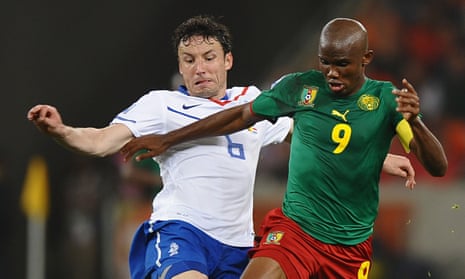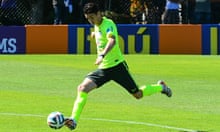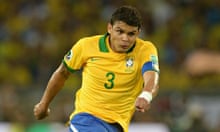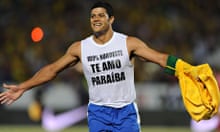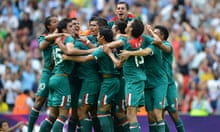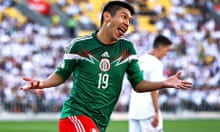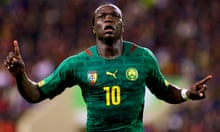This article is part of the Guardian’s World Cup 2014 Experts’ Network, a co-operation between 32 of the best media organisations from the countries who have qualified for the finals in Brazil. theguardian.com is running previews from four countries each day in the run-up to the tournament kicking off on 12 June.
It is always difficult to second-guess a manager’s intentions but, in all probability, Volker Finke will deploy his usual 4-3-3 formation with Cameroon in Brazil, picking whichever players are the most in form at the time.
Cameroon are not approaching this World Cup in the same way that they did back in 1990, when they became the first African country to reach the quarter-finals. Times have changed, and so has football. And the stakes are different, too. And yet, the current squad is strangely similar to Roger Milla & co, in so far as they are driven by the same determination, combativeness and eagerness to make history. These are the attributes that Finke has sought to foster to ensure the team gets out of the group.
Ever since taking charge of the team in May 2013, Finke has almost always used a classic 4-3-3, only occasionally trying a 4-4-2 or 4-1-3-2. The personnel tends to change quite a lot, but there are a few fixtures. Charles Itandje will almost certainly be the first-choice goalkeeper in Brazil, having enjoyed a good season both internationally and for his club, Konyaspor in Turkey, where he conceded 45 goals in 33 matches.
Nicolas N’Koulou and Aurélien Chedjou appear to have established themselves as the preferred choice in central defence in recent months despite poor club seasons. In contrast, Henri Bédimo is likely to edge out Benoit Assou-Ekotto at left-back thanks to an excellent campaign at Lyon, where, in addition to solid defending, he proved a regular threat going forward, finishing the season with one goal and eight assists. Allan Nyom could get the nod at right-back ahead of Gaëtan Bong and Dany Nounkeu.
There are few certainties in midfield. Stéphane Mbia looks most likely to be given ball-winning responsibilities on the back of a splendid season with Sevilla. Finke will probably put more mobile players alongside him, such as Enoh Eyong, Jean II Makoun or Barcelona’s Alex Song, or perhaps even Salli Edgar, who was the driving force behind Lens’ promotion back to the French top flight.
Cameroon’s greatest assets are up front. Samuel Eto’o, who will captain the side, looks likely to lead the attack even though his goal drought is becoming a worry. Vincent Aboubakar will play on the right-hand side, from where he will carry a heavy burden of expectancy. He was the one shining light in the team’s 5-1 friendly loss to Portugal earlier this year, when he successfully translated his superb form with Lorient in France on to the international stage. It is less clear who will start on the left, with Finke having to choose between two very similar players, Eric-Maxim Choupo-Moting and Pierre Wébo.
Who is the player who is going to surprise everyone at the World Cup?
I genuinely believe that the Cameroonian revelation at this World Cup could be Stéphane Mbia, assuming he is fully fit. He has put his Queens Park Rangers misadventure behind him and has enjoyed an excellent season for Sevilla, during which he reached a level of technical and even athletic prowess that had not been seen from him before. He can serve both as a ball-winner and a playmaker and could be crucial for Cameroon.
Who is the player who is going to disappoint the most?
I fear it could be Samuel Eto’o. He is undoubtedly the star of the team but he has not been in great form for a while. He is not the same player he was in 2006 and 2010 yet he remains the captain of the team and exerts a major influence. Whether positive or negative remains to be seen. If Cameroon flop, he will bear the brunt of the criticism.
What is the realistic aim for your team at the World Cup and why?
It is very difficult to predict anything with confidence about this team, as the last four years have been pretty abysmal, with occasional peaks. Getting to the second round is not beyond them and the players are certainly highly motivated, as they are eager to put the chaotic recent past behind them. Mexico, Croatia and Brazil are formidable opponents but Cameroon are no minnows.
Arthur Wandji writes for Camfoot.com
